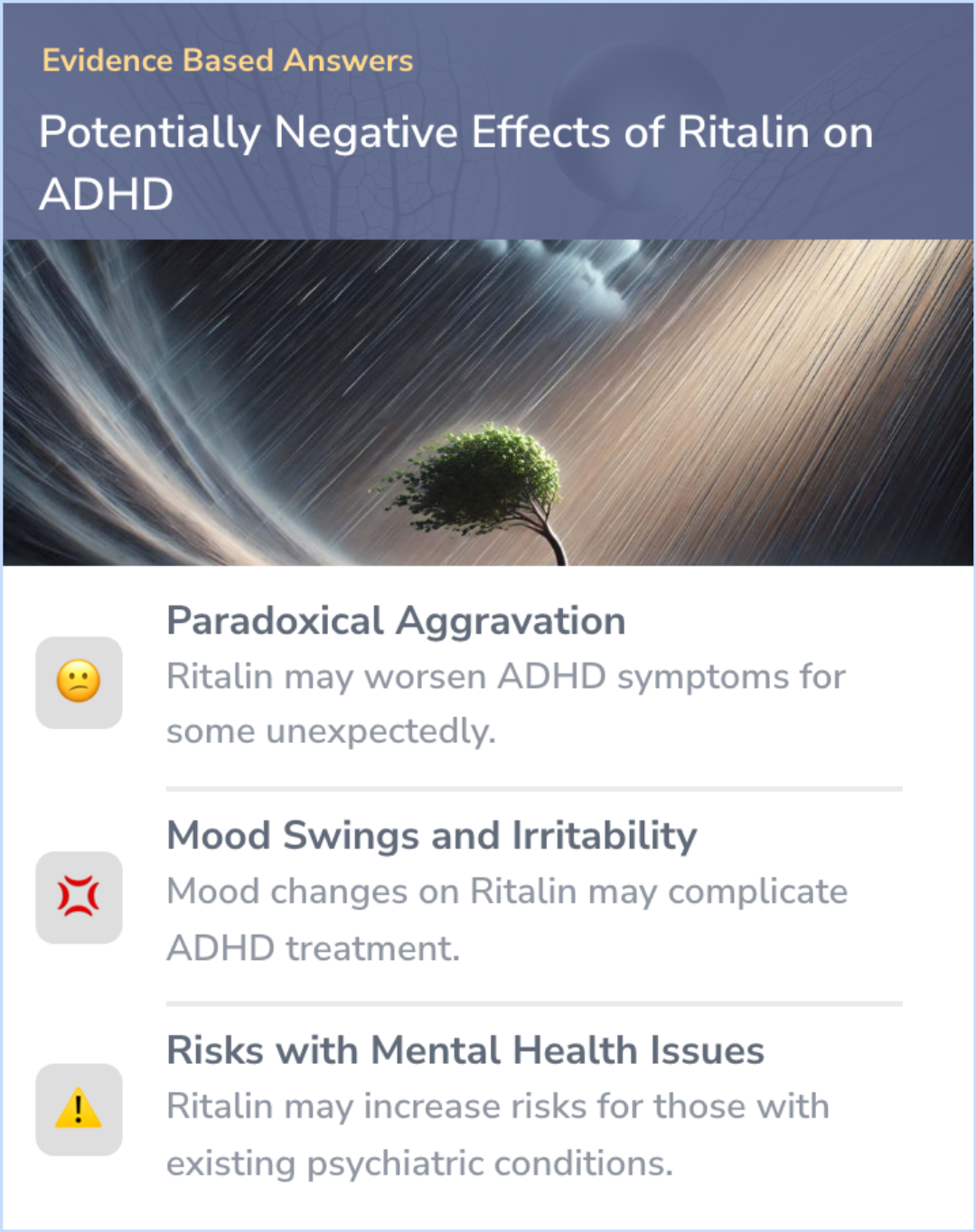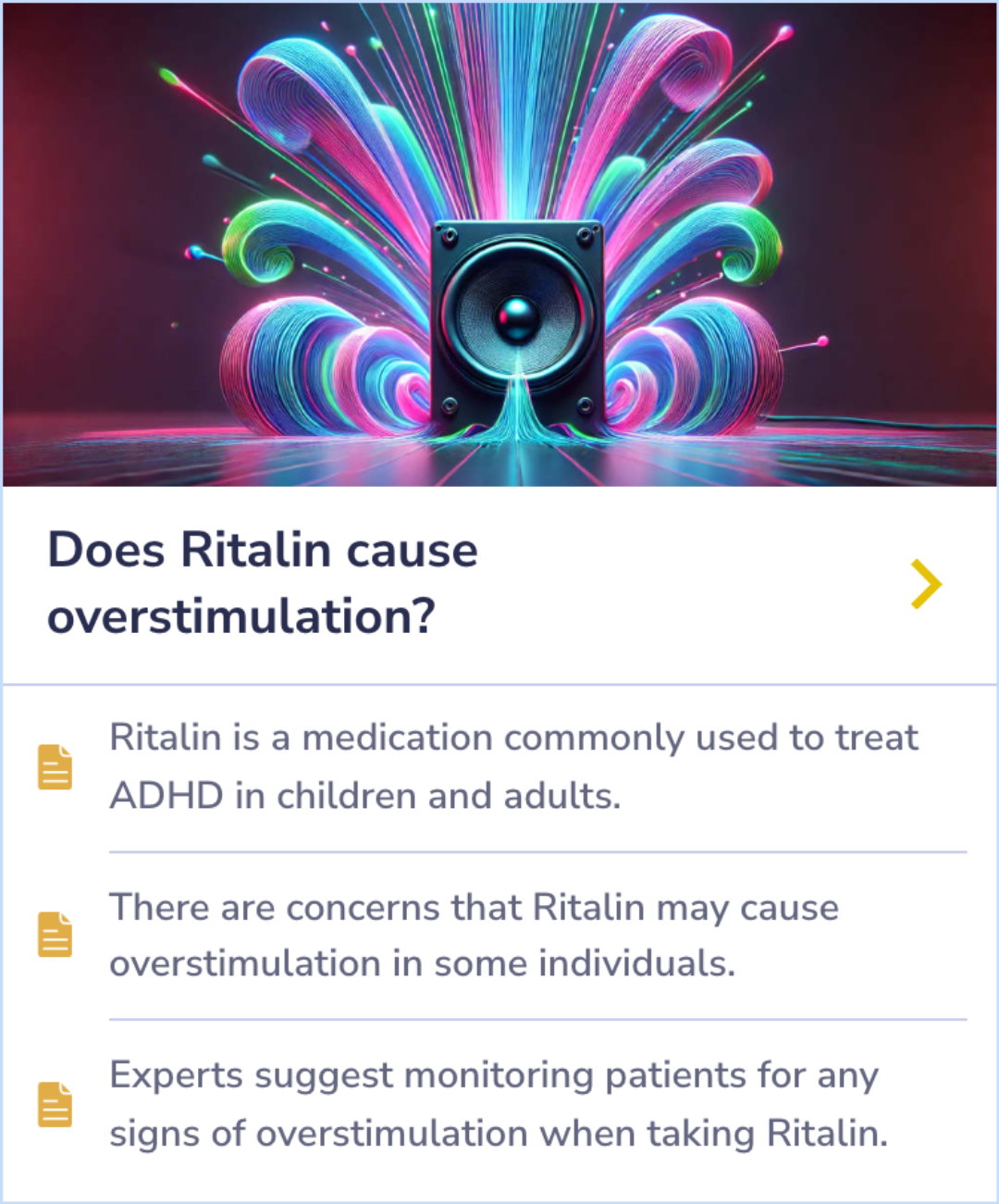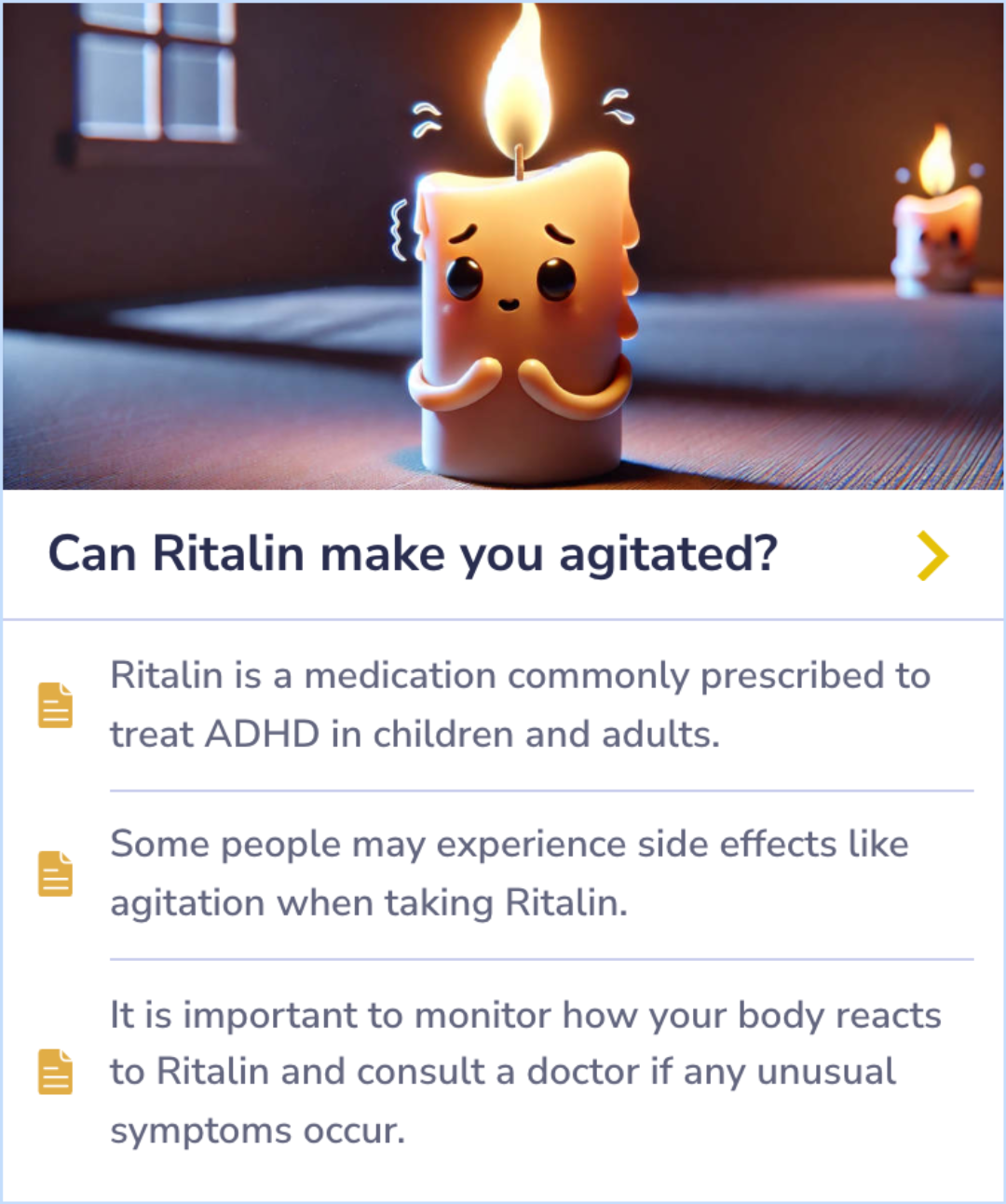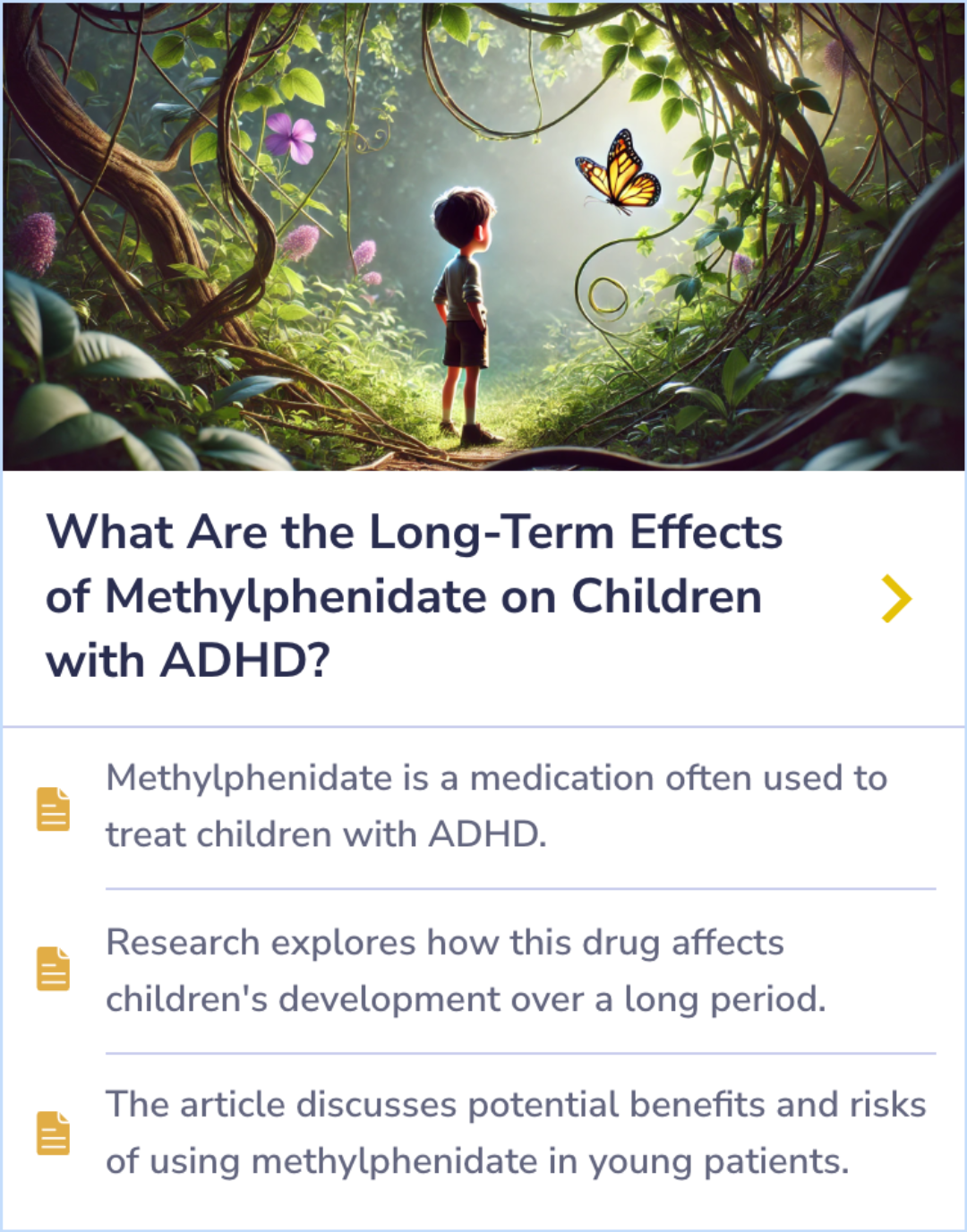Ritalin
Evidence Based Answers
Can Ritalin make ADHD worse?
Ritalin can exacerbate ADHD symptoms in rare cases, termed 'paradoxical aggravation.' Mood disruptions may arise, complicating treatment. Risks are heightened in those with other mental health issues, suggesting a need for careful monitoring.
Published: November 8, 2024
Click to explore a section:

Ritalin can worsen ADHD symptoms rarely, affect mood stability, and increase risks in those with mental health issues.
Potential Worsening of ADHD Symptoms
Ritalin, like other stimulant medications, can occasionally worsen ADHD symptoms for some individuals. This rare phenomenon, often called 'paradoxical aggravation,' may happen when treatment makes symptoms worse instead of better.
Clinicians may lower the dose or stop treatment in these cases to manage the effects.
Clinicians may lower the dose or stop treatment in these cases to manage the effects.
“
Source Quotes:
If paradoxical aggravation of symptoms or other adverse effects occur, reduce dosage, or, if necessary, discontinue the drug.
Patients beginning treatment for ADHD should be monitored for the appearance of or worsening of aggressive behavior or hostility.
Mood and Emotional Changes
Some individuals taking Ritalin may experience mood swings, irritability, or sudden changes in emotions. These side effects can complicate treatment by making ADHD symptoms appear worse.
Mood changes may indicate that the medication dose or type needs adjustment.
Mood changes may indicate that the medication dose or type needs adjustment.
“
Source Quotes:
Patients are more prone to become easily agitated, irritable, or depressed and go through mood swings/lability.
Clinicians should screen for symptoms of depression, agitation, aggressiveness, new-onset or pre-existing psychosis or mania, and suicidality as these can be worsened when initially starting methylphenidate.
Risks for Individuals with Co-Occurring Conditions
Ritalin may pose additional risks for people with co-occurring mental health conditions, such as bipolar disorder. Starting treatment has been linked to an increased risk of mania and other psychiatric symptoms.
This highlights the importance of careful consideration of the individual's mental health profile during treatment.
This highlights the importance of careful consideration of the individual's mental health profile during treatment.
“
Source Quotes:
In a study of data from national registries in Sweden, treatment-emergent mania was found to be associated with the initiation of methylphenidate treatment in adults with co-occurring bipolar disorder and ADHD.
Administration of stimulants may exacerbate symptoms of behavior disturbance and thought disorder in patients with a preexisting psychotic disorder.
Behavioral Side Effects
Unexpected behavioral side effects, such as repetitive movements or compulsive behaviors, may occur with Ritalin even at standard doses. These behaviors can persist during treatment and may not be related to changes in dosage.
Patients should work with healthcare providers to address any behavioral changes that affect daily life.
Patients should work with healthcare providers to address any behavioral changes that affect daily life.
“
Source Quotes:
Abnormal movements were observed in 27 of these 34 subjects and these included: orofacial (buccal-lingual) movements, stereotypic movements, and compulsive behaviours.
The onset of the behaviours was not dose-related, nor were the behaviours transient as they usually were exhibited throughout the treatment week for a specific dose but could alter or disappear on a different dose.
Background: Potential Worsening Effects
Ritalin may exacerbate or bring about new behavioral and thought disorders, including worsening bipolar illness and aggressive behavior. These reactions highlight the importance of monitoring for changes in mood or aggression.
Additionally, it is critical to promptly inform a doctor if psychotic symptoms such as hallucinations or delusions, or new manic symptoms emerge during treatment. This is to prevent further escalation of these reactions.
Additionally, it is critical to promptly inform a doctor if psychotic symptoms such as hallucinations or delusions, or new manic symptoms emerge during treatment. This is to prevent further escalation of these reactions.
Key Takeaways
Conclusions
Ritalin, known for alleviating ADHD symptoms, can occasionally cause what is called 'paradoxical aggravation,' worsening symptoms for some patients. This is rare, but when observed, clinicians might adjust or halt treatment.
Additionally, Ritalin can trigger mood swings and unexpected behaviors in some individuals, especially those with other mental health conditions, such as bipolar disorder. Careful monitoring and tailored management are important to address these concerns.
Additionally, Ritalin can trigger mood swings and unexpected behaviors in some individuals, especially those with other mental health conditions, such as bipolar disorder. Careful monitoring and tailored management are important to address these concerns.

Evidence Summary
Monitoring Ritalin for Overstimulation Risks
Ritalin is widely prescribed to treat ADHD in both children and adults. However, some individuals may experience overstimulation, which can manifest in various ways. Monitoring patients closely is recommended to identify signs of overstimulation early.
Experts emphasize that careful oversight of Ritalin treatment can help manage any potential overstimulation effects, ensuring that therapy remains effective and safe.
Experts emphasize that careful oversight of Ritalin treatment can help manage any potential overstimulation effects, ensuring that therapy remains effective and safe.
Evidence Summary
Monitoring Reactions to Ritalin
Ritalin is a widely used medication for ADHD, yet it can lead to side effects like agitation in some individuals. Monitoring how you feel while taking Ritalin is key, as noticing unusual symptoms can help you and your healthcare provider make necessary adjustments.
Being aware of your body’s reactions is essential. If agitation or other unexpected symptoms arise, reaching out to a doctor can ensure you receive the best care while managing your ADHD effectively.
Being aware of your body’s reactions is essential. If agitation or other unexpected symptoms arise, reaching out to a doctor can ensure you receive the best care while managing your ADHD effectively.
Evidence Summary
Methylphenidate's Long-Term Impact on Children with ADHD
The article dives into how methylphenidate, a widely used ADHD medication for children, may impact long-term development. Researchers examine both potential benefits, like improved focus and behavior, and possible risks associated with prolonged use.
The discussion covers how this medication works over time and raises questions about how it could influence a young patient's growth and overall well-being.
Parents and caregivers might find this exploration of benefits and risks informative when considering treatment options.
The discussion covers how this medication works over time and raises questions about how it could influence a young patient's growth and overall well-being.
Parents and caregivers might find this exploration of benefits and risks informative when considering treatment options.


